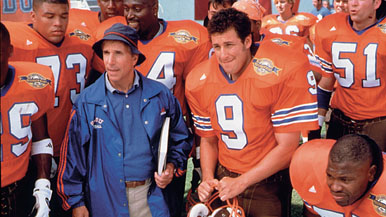Hollywood Psych
By Sean Collier
June 15, 2009
BoxOfficeProphets.com

In the 1990s and through most of this decade, comedy was the realm of a pack of megastar funnymen. Before the turn of the century, it was the likes of Mike Myers, Jim Carrey, and Adam Sandler; in the 2000s, we had Ferrell, Vince Vaughn and Jack Black. These stars, both then and now, preceded the subject matter of the film in terms of marketing impact. Think of a film like The Waterboy – you wouldn't describe it as "A comedy about a backwards bayou football player," you would describe it as "That Adam Sandler football movie. Not The Longest Yard, the one that was kinda funny." More recently, Will Ferrell has trusted that all he has to do is change costumes to sell tickets, especially with his yawn-inducing sports run (Talladega Nights, Blades of Glory, Semi-Pro.)
The idea was that we trusted these actors to be funny, and weren't much concerned with what the film was about; we had a good inkling of what the movie would feel like and what we were getting for our money. Studios saw this, and rode basically every bankable comedy star to a half-dozen projects – the model perhaps best demonstrated by Jim Carrey's early career, as Ace Ventura flowed into The Mask, Dumb and Dumber, The Cable Guy, Liar Liar, on and on until The Truman Show broke the streak.
Currently, we should be in the period of time when one group of manchild actors phases out and the next phases in; around the turn of the last decade, Ben Stiller and Owen Wilson bridged the gap between '90s comedy and 2000s comedy quite naturally. Instead, however, comedy seems to be shedding the need for bankable stars.
2007 was the great kick-off of this trend, as the two top-grossing comedies for grown-ups were Knocked Up ($148.7 million) and Superbad ($121.4 million.) Knocked Up marketed itself around Seth Rogen, then an almost complete non-entity, and Superbad appealed to the minor followings that Jonah Hill and Michael Cera had amassed, but mainly rode a wave of good advertising to success. Both films out-grossed such star-driven comedies as Adam Sandler's I Now Pronounce You Chuck and Larry, Ferrell's Blades of Glory, Steve Carell's Evan Almighty, and Eddie Murphy's Norbit. Rogen and Hill proved more bankable than the last 20 years of comedy superstars.
Meanwhile, those stars continue to search for hits. Mike Myers utterly destroyed his career with the heavily marketed, $32 million-grossing bomb The Love Guru. Jim Carrey's highly touted return to comedic form, Yes Man, couldn't scrape together $100 million over the 2008 holiday season, while Adam Sandler's Bedtime Stories struggled as well. Will Ferrell has put up two certifiable bombs in Semi-Pro and, now, Land of the Lost. And the less said about Eddie Murphy, the better.
At last, it seems, audiences are responding to the premise rather than the film. Knocked Up, Superbad, The Hangover, and more humble hits like Pineapple Express, Forgetting Sarah Marshall and I Love You, Man have put out smart, targeted ad campaigns that focus on the story and the humor, rather than big stars behaving outrageously. It's important to distinguish that these films have stories, not gimmicks; a gimmick is Mike Myers in a funny suit, a story is we woke up in Vegas and can't find the groom.
Perhaps more interesting is the fact that the new successful comedies are not, by and large, making new stars – at least bankable ones. The 40 Year-Old Virgin, one of the best and most profitable comedies of the last few years, helped to make Steve Carell a household name; that didn't do him much good, however, when it came time to sell tickets for Evan Almighty. Seth Rogen was seen as a new breakout star after Knocked Up; while he's certainly keeping busy, he failed to carry either Zack and Miri Make a Porno or Observe and Report to any real success.
This trend is certainly bad news for actors; whereas ten years ago someone with a success the likes of Knocked Up could reasonably expect to have work thrown at them interminably for quite some time (see again one Stiller, Ben,) now, the right projects have to be continuously selected. Think too of the stars that have not gone anywhere at all, in spite of well-received comedies; Christopher Mintz-Plasse, anyone?
Hopefully, there's good news here for audiences; if filmmakers can no longer rely on a cadre of instant-money stars to pull in dollars, they'll have to pay more attention to what they make and how they market it. This is certainly good news in theory; in practice, however, one wonders if it won't merely produce endless clones of the last big hit.
What producers need to deduce is not what the audiences like (which is variable,) but rather, why this trend is occurring in the first place. There wasn't any big comedy letdown that preceded it; the later Will Ferrell or Jim Carrey movies weren't disasters, by any means, and this shift can't be taken as a sign of audiences losing faith in stars. Perhaps it's merely a by-product of too many big outrageous comedies; perhaps we'd rather laugh hard and think at the same time. This is a premise that the success of the Apatow films would indicate (but The Hangover, good though it may be, contradicts.)
It's more likely that this is simply a shift in tastes, and star-driven comedy will be back. For now, however, The Hangover is yet another chapter in the confusing box-office story of 2009; stars fail, unknowns score, tentpoles flop, January rejects succeed. It'll take time and perspective to sort out what happened this year; come 2010, we'll find ourselves asking what happened, when it happened, and why is there a tiger in the bathroom?